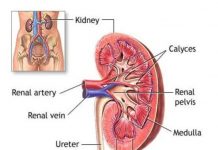The prospect of kidney cancer, indeed any cancer, can be frightening in the extreme, and a definitive diagnosis should be made if any of the commonly noted symptoms of kidney cancer are experienced – a persistent pain on the side, passing blood along with urine, fatigue or general feeling of being unwell, unexplained weight loss, fever or a feeling of a lump in the side.
Kidney cancer diagnosis
 If the above kidney cancer symptoms are noted, it is important to fix an appointment with the doctor to figure out what the problem is.
If the above kidney cancer symptoms are noted, it is important to fix an appointment with the doctor to figure out what the problem is.
To begin with, the doctor may conduct a physical exam and by palpating the abdomen and the side where the pain/lump is experienced.
Vital stats such as blood pressure, temperature and so on will be checked. Blood and urine samples will be taken to try and detect any signs of the disease.
In particular creatinine levels are checked to see gauge how well the kidneys are functioning.
In addition further tests such as the Intravenous pyelogram (injecting of a dye to highlight the kidney and surrounding organs), or imaging tests such as a CT scan (detailed pictures taken via x-ray), an MRI (magnetic resonance imaging) or an ultrasound test or a sonogram may also be performed to make help in the process of diagnosis.
Where required a biopsy may be performed by inserting a needle into the kidney to remove a small piece of tissue for analysis. However a biopsy does, in many cases, yield a false negative and so may not be performed at all.
The imaging techniques usually yield enough information for the doctor to make a decision to perform a surgery to remove a part of or the entire kidney.
The Stages of Kidney Cancer –
Stage I
The tumor is restricted to the kidney only at this stage, and the size of the tumor could be anything up to 7 centimeters in size (diameter).
Stage II
When the size of the tumor has increased to exceed 7 centimeters but is still confined to the site of the kidney, this is considered to be the second stage of kidney cancer.
Stage III
At this stage the cancer would have spread to the tissue surrounding the kidney, such as the adrenal glands, or the lymph nodes situated close by.
Stage IV
This is the stage where the cancer would have spread not just to the lymph nodes but also to other parts of the body such as the bones, or other organs such as the lungs, liver or even the brain.










